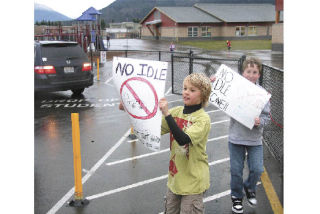Braving near-freezing temperatures, fifth graders Jimmy Jacobson and Max Puff energetically reminded parents waiting for children to emerge from Cascade View Elementary School not to let their vehicles idle over several afternoons last week.
“It’s for your own good! Turn off your car!” exclaimed Jacobson, holding up a hand-lettered sign with the crossed-out image of an exhaust-emitting sedan.
Obediently, the adults killed their engines, halting the release of exhaust pollutants into the air. Some drivers gave the boys a thumbs-up. The victories got the students cheering, and pumped them up as they ran to the next car.
“The kids are so excited about helping the earth,” marveled Elizabeth Johnson, who teaches fourth grade at Cascade View and also leads the school’s new Green Team.
The children’s no-idling campaign was a kickoff to the Green Team’s efforts to create a more sustainable campus. Students encouraged parents to respect newly installed “No Idling” signs, designed to reduce pollution and carbon emissions around the school.
Drivers should turn off their engines if stopped for more than 30 seconds, according to the U.S. Environmental Protection Agency’s Web site. Johnson said the school ordered the signs after learning that reducing idling helps children with asthma.
“If there’s less pollution in the air, then we’ll have better air to breathe and we’ll have cleaner lungs. And in the future, if global warming keeps up, the earth’s just not going to be a very happy place,” said Green Team member Maddie Hotchkin.
The group of nine fifth-graders had its first bi-monthly meeting in December, and came up with a plan to educate peers about being more earth-friendly.
Cascade View has already started recycling milk cartons, and also made the switch from disposable plastic eating utensils to metal ones. Students said efforts in the cafeteria could go even further.
“When we serve soup, they’re in styrofoam bowls, and styrofoam bowls can never be re-used. We could get plastic bowls for that,” Hotchkin said.
She also thought kitchen employees could pour syrup directly onto pancakes and French toast on brunch days rather than using disposable plastic ramekins; replacing ketchup and mustard packets with big condiment dispensers could reduce waste, as well.
Appropriately, the team planned to pay for such projects by recycling. A Wal-Mart program pays $5 for every 60-gallon bundle of plastic bags. Turning in ink-jet cartridges and used cell phones will also help the club raise funds.
The Green Team is also collecting used eyeglasses to be redistributed to Valley families in need.
Other earth-friendly efforts at Cascade View include litter cleanups, peer education campaigns, and “Waste-free Wednesdays,” when students are encouraged to bring their lunches in re-usable containers.
Jacobson envisioned a display in the cafeteria that would educate students on how long it takes for different types of waste to biodegrade.
“Styrofoam stays in the landfill forever,” he said, adding that plastic’s decomposition rate isn’t much better.
“If you can recycle, be sure to recycle it,” Jacobson said. “I try to recycle as much as I can.”
Cascade View joins other schools around the Valley in their green efforts, according to the Snoqualmie Valley School District. Among the projects:
• Mount Si High School students are working to restore the Snow Lake Watershed.
• Fall City Elementary won a grant to install solar panels in campus, and is working on a plan with A and R Solar of Snoqualmie and Walker Randalls of Peak Electric of North Bend.
• A food scrap recycling plan at Two Rivers School received a mini-grant from King County to experiment with bioreactors in order to better understand decomposition. Teacher Elise Cooksley’s Green Team hopes to ultimately institute a lunchtime program to compost food scraps. their green efforts, according to the Snoqualmie Valley School District. Among the projects:
• Mount Si High School students is working to restore the Snow Lake Watershed.
• Fall City Elementary won a grant to install solar panels in campus, and is working on a plan with A and R Solar of Snoqualmie and Walker Randalls of Peak Electric of North Bend.
• A food scrap recycling plan at Two Rivers School received a mini-grant from King County to experiment with
bioreactors in order to better understand decomposition. Teacher Elise Cooksley’s Green Team hopes to ultimately institute a lunchtime program to compost food scraps.


